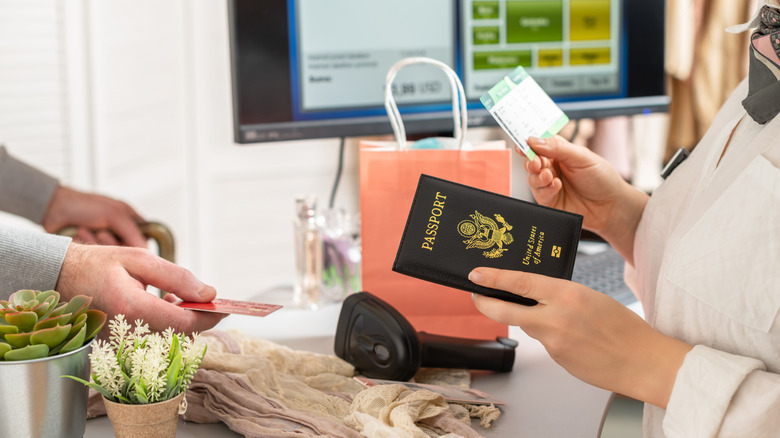Why Duty-Free Cashiers At The Airport Ask To See Your Boarding Pass Before You Pay
One common airport mistake that will cost you money is not stopping by the duty-free stores at international terminals to purchase items that can often come with a discount, depending on where you are flying. However, be prepared to show the cashier your boarding pass prior to buying for your items. The reason is that you are technically in a space that is undefined with geopolitical borders, rules, and regulations, many of which impact your duty free purchases. For example, American citizens can possibly get $200, $800, or $1,600 in tax exemptions, depending on where they are re-entering the United States from. These designated exemptions of spending are not taxed upon crossing the American border, but the amounts and rules vary from country to country.
Because travelers have not yet reached their destination, duty-free is not overseen by a regulatory government organization to put the tax on the products bought in these stores. Therefore, the cashier must record that information so that the duty-free products can be assessed and taxed accordingly upon their arrival at the traveler's final destination. This does not just apply to airports, but extends to cruise ships and other sea vessels that port and cross international borders and waters.
Which products are best to buy duty free?
There are a few simple ways to save money while flying or on a cruise, and one of them could include duty-free shopping based on the product and where you are headed. Items like cosmetics, alcohol, accessories, tobacco, and clothing can sometimes be cheaper when purchased at a duty-free store, though they can often be found for a better price at your final travel destination. Additionally, purchases such as perfumes, electronics, watches, and jewelry can all be smart buys, but again, do some research to make sure there is not a better price outside of the international airport or seaport you might be shopping in currently.
Americans have a limit to how many duty-free purchases they can make, with the rule of thumb generally being that in a 31 day span of time, $800 per American citizen can be bought and brought across the border to the United States. All items bought at duty-free stores must be declared at customs on a form and those who go over the allotted amount can face "duties" or fees for the extra cargo they are bringing with them.
The growing business of duty-free shopping
While the stores might be small to midsized, the business of duty-free shopping is not. A 2025 Coherent Market Insights report showed that duty free retail marketing is valued at $49.89 billion and forecasted to hit $88.88 billion by 2032, with a compound annual growth rate of 8.6% across that eight year projection. Apps like Shop Duty Free and World Duty Free are expanding the market, allowing consumers to buy and reserve duty free items online ahead of visiting the physical stores.
Those duty-free shops with prices listed on products allow customers to put in a departure location in order to make a reservation, with many stores can place a hold on in the range of 24 hours or in some cases, up to 30 days. From there, duty-free customers pay upon arrival — with a boarding pass or passport required to be shown upon pick up. It's important to shop around and compare prices, but duty-free can be an alternative cost-effective option for passengers of airlines and cruise ships to stop making major money mistakes while traveling.


